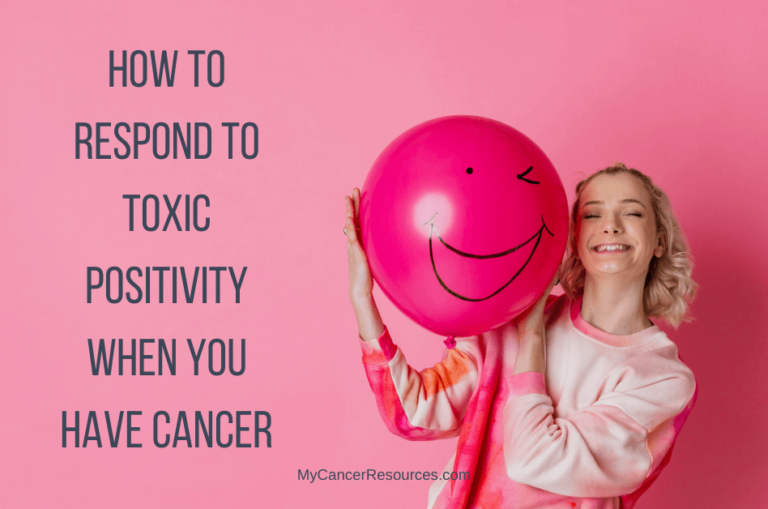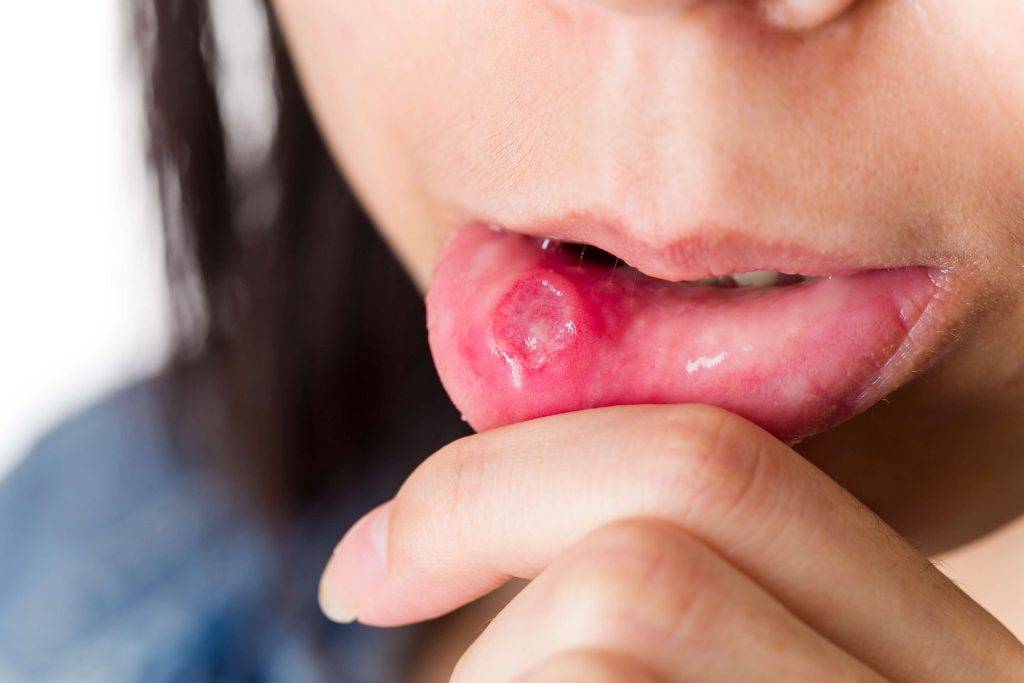
After your cancer diagnosis, you may be bombarded with well-wishers, encouraging you to keep a positive outlook. This can provide comfort and motivation to stay positive during the difficult days ahead.
Encouragement is indeed needed on the cancer journey, and focusing on positive thoughts does improve mental health.
So there is definitely a time and place for being positive.
But there’s a point when the ‘only positive vibes’ movement becomes too much and is unhealthy and harmful.
This is called toxic positivity, and it can destroy your mental health.
This post covers what toxic positivity is, some common toxic phrases you might hear during your cancer experience, and how to respond to toxic positivity.
After all, you want to keep your friends close during this tough time, but it may take some clear and direct communication to ensure your emotional needs are met.
What is Toxic Positivity?
Toxic positivity sounds like a good thing at first—only focusing on the positive, pushing aside bad days, and always keeping a happy face. It’s all over social media – people are always posting like each day is their best day ever.
This might make you feel like you must hide your real feelings and put on a brave face, even though you’re facing a terrifying cancer diagnosis.
The reality is this approach of ignoring struggles and only showing good vibes is unhealthy.
Toxic positivity is the mindset and approach that only happy emotions are acceptable and that simply keeping a positive attitude will solve most or all mental or physical problems.
Unfortunately, on the flip side, this approach means unpleasant emotions like fear or anger cannot be felt.
A person is supposed to push their own negative emotions to the side and simply “put on a happy face” as though that will make everything better.
Falling prey to toxic positivity can actually make you feel worse. You’re being forced to wear a mask.
Your genuine emotions, especially the uncomfortable ones like sadness or fear, are part of being human.
When someone says things like “negative thoughts only bring you down,” they’re not giving you space for a very normal response to your diagnosis. It’s important to remember that it’s okay not to be okay.
David Kessler, a grief expert I’ve mentioned in this post about the stages of grief, describes toxic positivity in a very clear way: “Positivity given in the wrong way, in the wrong dose, at the wrong time.”
This means that there are times when being upbeat and positive are appropriate, but not when that comes at the expense of expressing all the emotions you’re experiencing as you’re adjusting to life with cancer.
If you’re expected to ignore negative feelings or someone demands that you be positive amid difficult experiences, you know you’re being subjected to toxic positivity.
It’s not ok for someone to insist that you ‘Grin and bear it’ when you need a safe space to be heard and receive empathy.
A cancer diagnosis sucks, plain and simple. Some days will be better than others, but no one wants to feel pressured to be unrealistically optimistic in the face of bad news.
Someone saying ‘positive vibes only’ after you hear that the cancer has spread is a slap in the face to the reality that you’re experiencing.
That cliche expression doesn’t help the situation and certainly doesn’t make you feel like you can truly lean on that person for support when you need it most.
Toxic positivity can also come from within. If you’re telling yourself to ‘toughen up’ or ‘quit whining because so-and-so has it worse’, you’re denying the emotional pain that you’re feeling.
You’re trying to stuff it down and ignore it, hoping positive emotions will take over and make things better.
But the reality is, it’s essential to feel all the feelings and not label them as ‘good’ or ‘bad’. If you find your self ‘shoulding’, like “I should be only happy”, that’s an example of toxic positivity you’ll need to break away from.
The best thing you can do for yourself during your cancer experience is to acknowledge all your emotions.
Processing all of your different feelings in a healthy way helps you adjust and cope in the best way.
The Impact of Dismissing Negative Emotions
Feeling sad, angry, or frustrated is a normal human experience. It’s your mind’s way of saying, “Hey, something’s not right here.”
If we ignore these signals, we’re telling ourselves our true emotions aren’t important.
This can lead to feelings of shame.
People who don’t express challenging emotions often pull away from their friends and family, either because putting on that mask constantly is too much to handle or because they don’t feel truly supported by their network.
Then, feelings of abandonment can grow and can spiral into depression and other mental health issues.
So, while sitting with painful emotions is uncomfortable, it’s important to do so.
It’s also important to speak up and let others know what you need so that they can stop their cycles of toxic positivity and provide the support you need and deserve.
Common Toxic Phrases
In this post I share common phrases that are toxic positivity so that friends and family can avoid those comments and provide tips on what to say instead to support you.
While most toxic positivity comments come from a place of good intentions, many people don’t understand that such comments can be hurtful.
They may say things to remove your fear or frustration but don’t realize that it can send the message that your fear is too much for them to handle.
It might be because they are scared and don’t know how to react. Simply telling you, “You’ve got this!” may be their way of trying to lessen your fear.
But if you come to them over and over trying to express your emotions, and they’re dismissive, that can add to your concerns.
Their lack of empathy can make you feel alone. You may become scared of being a downer or burdening others with your real feelings.
Shutting difficult emotions down only makes them build over time, which can lead to problems with both your mental and physical health.
Some common phrases you might hear from others after your cancer diagnosis include:
- “Everything happens for a reason” – while it may be intended to imply that it’ll all work out ok, how exactly should someone respond to this? “Oh, good! Tell me the reason why cells in my body went haywire and developed into cancer!”
- “Look on the bright side” – while at some point you may discover meaning or find a positive that’s come from having cancer, in the moment, thinking that cancer is somehow good can feel very dismissive.
- “It’ll be okay” – the truth is, no one knows if it’ll be okay or not, or even what your definition of being okay is. It’s unfair to make empty promises when there’s no guarantee.
- “Just focus on the good” – while being grateful for things in your life is a healthy practice, not every day is going to be good.
Telling someone to focus on the good when they’re throwing up constantly from chemo invalidates their reality, which is, in that moment, life really sucks.
How to Respond to Toxic Positivity
If you’re on the receiving end of toxic positivity, here’s how to navigate those conversations so you can receive authentic support.
First, identify your own feelings. Being able to identify and express your different emotional states is important in sharing with others where you are at in the moment.
Check out this feeling wheel if you’re struggling to put words to what you’re feeling. Once you know how you feel, you can identify what you need.
– If you’re exhausted, would a nap help?
– If you feel helpless, do you need a shoulder to cry on without them trying to give you advice?
– If you feel confused and overwhelmed when you have to make a treatment decision, would someone simply listening without trying to guide you in one direction or another be the most helpful?
When you are trying to express your feelings to another person, and their response is something dismissive, like “Don’t worry”, explain to them what you need at the time. This could be something like:
- “It’s normal for me to feel scared before going into surgery. Can you please validate what I’m saying and don’t try to discount my feelings?”
- “I’ll eventually be able to look on the bright side, but right now, I need to sit with my emotions.”
- “I just need to vent right now, I don’t want advice.”
- “I know you want to make me feel better when you tell me I’ve got this, and it’ll all work out, but we really don’t know how things will unfold. I need to hear that you’ll be by my side no matter what happens.”
- “What would be most helpful is if you could help me think through my options.”
Also, don’t compare your journey with anyone else. Even if you have the same type of cancer as the person next to you in the infusion room, their experience is going to be different than yours.
They are likely in a different phase of grief from their diagnosis, and the way they respond to treatment will also be different.
Your journey is your own. It’s not better or worse than someone else’s journey. It’s simply different.
Everyone with cancer needs and deserves support and care, and that includes how you care for yourself – don’t fall into that comparison trap – it serves no purpose.
Finally, avoid social media, anything, or anyone that makes you feel unworthy or imperfect.
There’s not a lot you can control when you have cancer, but choosing whether or not you engage with social media or a person who exudes toxic positivity is certainly something you can control.
Fostering A Positive Yet Realistic Outlook
It may seem like you’re walking on a tightrope, finding that sweet spot where you’re not drowning in negative thoughts but also not ignoring the real, sometimes tough, feelings.
How can you move forward without slapping a happy face on everything, especially when things are hard?
1. First, acknowledge your own emotions: the good, the bad, and the ugly. Feeling down? That’s okay.
It doesn’t mean you’re failing at being positive. It means you’re human.
The first step to a positive mindset is accepting all your feelings. This leads to a healthier way of dealing with challenges.
2. Next, look for the silver lining, but stay grounded. It’s like looking for a ray of sunshine on a cloudy day without expecting a full sunny sky.
I prefer the saying, “Not every day is good, but there is good in every day.”
It reduces the expectation that every day will be wonderful and acknowledges that a small glimmer of good can be found even on the worst days.
3. Create a safe space for yourself and others to share true feelings.
Ditch unrealistic expectations of eternal happiness and allow genuine emotions to show not just from yourself but from others as well.
When you’re genuine with your feelings, it encourages others to do the same. This, in turn, fosters meaningful connections.
Life with cancer is a wild ride full of ups and downs. Having a positive yet realistic outlook isn’t about ignoring the bad but managing how you respond to it.
4. Next time you hit a bump, remember it’s okay to feel upset. Just don’t stay there too long.
Find that good thing in the midst of difficulty, and let it guide you back to a mentally healthy place.
Thriving Beyond The Smile
Cancer throws your life into chaos. It’s okay to admit you’ve been thrown for a loop and are struggling.
Avoid toxic positivity from yourself and others around you. You shouldn’t feel pressure to keep a happy face even on bad days and ignore your real feelings.
Yes, facing uncomfortable emotions head-on is hard, but you can find emotional support when you seek help. It might be from close friends or family, your oncology social worker, a therapist, or a holistic cancer coach like me.
Finding support is a sign of strength, not weakness.
Proper support can help you approach your cancer experience with healthy positivity grounded in realism, where you can experience and share the full range of emotions you have in the face of challenges brought on by cancer.
If you want support from a caring, non-judgmental professional, reach out, and we can discuss how I can help.



